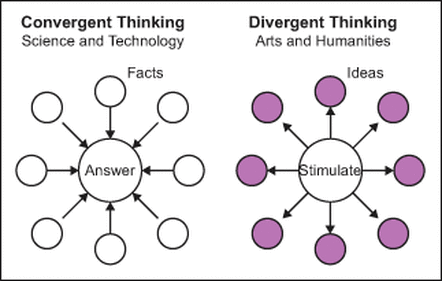The Divergent Thinking Child
Request Your Private Coaching
Do you have a stubborn child, a child that questions rules, argues with you, only wants to do things their own way? Are they bored with or resistant to school work? Do they come up with unusual, bizarre and sometimes conflicting opinions? Are they idiosyncratic, unconventional, improvisers or idea makers? If so, you just may have a divergent thinking child.
To understand a divergent thinking child, we first need to look at just what divergent thinking is. Basically, when trying to solve a problem there are two types of thinking: Convergent and Divergent. Simply put, divergent thinking is solving problems with many possible solutions, as opposed to convergent thinking, which is solving problems with a single, correct answer. Convergent thinkers use facts to come up with the most likely, common, or correct answer, where divergent thinkers look at ideas, which stimulates their mind to look at more ideas, they ultimately must "go out," or stretch the boundaries of all possibilities, before being able to "come in" to an infinite answer. For divergent thinking children this is just the way their brain works, they cannot turn off their divergent thinking, this is why when asked to come up with a "correct" answer to a textbook question, they may seem to be distracted, go off task, or if pressured to conform, at times get frustrated or simply refuse to do an assignment.
To understand a divergent thinking child, we first need to look at just what divergent thinking is. Basically, when trying to solve a problem there are two types of thinking: Convergent and Divergent. Simply put, divergent thinking is solving problems with many possible solutions, as opposed to convergent thinking, which is solving problems with a single, correct answer. Convergent thinkers use facts to come up with the most likely, common, or correct answer, where divergent thinkers look at ideas, which stimulates their mind to look at more ideas, they ultimately must "go out," or stretch the boundaries of all possibilities, before being able to "come in" to an infinite answer. For divergent thinking children this is just the way their brain works, they cannot turn off their divergent thinking, this is why when asked to come up with a "correct" answer to a textbook question, they may seem to be distracted, go off task, or if pressured to conform, at times get frustrated or simply refuse to do an assignment.
They say all highly creative or creatively gifted people are divergent thinkers - like genius artists and inventors of the past - programmed to question rules and the status quo, to seek out and argue toward new possibilities and solutions, to create and inspire. Unfortunately for divergent thinking children, their wonderfully imaginative, creative and divergent mind, is one of their most misunderstood inherent characteristics.
The same characteristic that may be valued in an adult whose out "of-the-box" thinking leads to a new invention, is often seen as disobedience, defiance, non-conformism, ADHD, ODD, even moral deficit, in the divergent thinking child. In actuality, divergent thinking or questioning of ideas is not in itself rebellion, but is at the base of all new discoveries. Divergent thinkers are the creators of this world, they think of the new, they are constantly looking for ways to invent, enhance, beautify, humor or improve - the insufficient, incomplete, normal or mundane. They have the unique ability to invent and create from nothing; inspiration and life changing invention.
"We cannot solve our problems ~
with the same thinking we used when we created them."
~ Albert Einstein ~
with the same thinking we used when we created them."
~ Albert Einstein ~
Still as children, divergent thinkers are often misunderstood, their ideas discounted and true value and potential ignored. They don't usually fit into the regular school classroom where conformity is expected, and creativity void focused-based learning and convergent thinking is the norm, and so many times struggle socially, emotionally and academically. They can usually feel they are somehow different, which can result in added social implications, self doubt, low self esteem and a feeling of isolation. In creatively gifted children, heightened intellect and emotional sensitivities can result in early awareness of world and sociological issues, which can weigh heavily on their small shoulders, and often results in an ongoing struggle with anxiety and existential depression. They seem to have an intense need to feel they are accepted for who they truly are, and that they - as well as what is important to them - are valued and understood, especially by those they are closest to. They can have intense interests, are drawn to the bizarre or unusual, and relish in details and endless possibilities. Many are intensely interested in art forms that are considered time-wasters by some adults; art, drawing, music, fashion, videos, fandoms, video games, and the like, because they are able to see the artistic or creative side of these interests and activities; the depth, endless possibilities for exploration, invention and change, and the provision of autonomy and mental solitude captivates as well as soothes the highly creative and divergent thinking mind. Intense or unusual interests are common in gifted and highly creative children, and may vary or come and go as to importance or priority in their lives. It is important to understand this aspect of divergent thinking children, and where possible allow adequate time for what is presently important to the child.
Parenting a divergent thinking child at times is not a simple task, especially for convergent thinking parents, It has taken many of us years to find that "magical combination" or balance between school and allowing our children enough space and time to identify and develop their own creative ideas, perspectives and passions. Many of us have come from backgrounds that did not support individuality, creativity, or even the idea of respect and acceptance of who a child truly is, especially if that child did not fit in or assimilate with the "norm." Learning to support our divergent thinking children and their very unique way of solving problems and looking at the world, is often an ongoing journey in our own education, of tolerance and acceptance. However, even small strides in our knowledge of and effort towards fully accepting and supporting our children for who they truly are, and providing them positive opportunities where their divergent thinking is utilized and valued, can make a huge difference in how they perceive themselves and in their gaining the confidence needed to go out and pursue their own uniquely creative passions and dreams,
So, the next time your child asks a question to a question, stubbornly goes off prompt or off task, argues about doing things their own or a different way, don’t automatically assume what you are seeing is a behavioral issue. Instead, take some time to listen to them, ask them questions to help them delve deeper into their thoughts and ideas, listen to their reasoning and their amazingly imaginative, creative and divergent mind. When you do, you might just be surprised that the things they care about, what interests them enough to make them want to imagine the bizarre, invent the unusual, and improvise or improve the insufficient or mundane, are something of value and worthy of your support.
Hugs & Happy Parenting,
Julie L Gibson-Vasquez
The Proactive Parenting Coach



